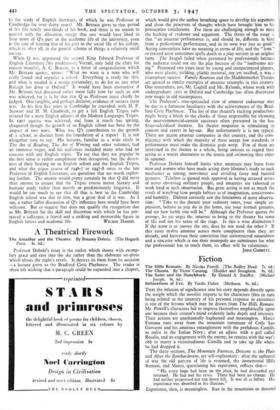A Theatrical Firework
The Amateur and the Theatre. By Bonamy Dobree. (The Hogarth Press. 3s. 6d.) Professor Dobree's essay is the rocket which shoots with exemp- lary grace and ease into the sky rather than the elaborate set-piece which closes the night's revels. It derives its form from its occasion —a lecture given to the Bradford Civic Playhouse. The reader is often left wishing that a paragraph could be expanded into a chapter,
which would give the author breathing space to develop his argument and show the processes of thought which have brought him to his provocative conclusions. For these are challenging enough to need the backing of evidence and argument. The thesis of the essay is that " an amateur performance is, and should be, different in kind from a professional performance, and in its own way just as good." Acting conventions have no meaning in terms of life, and the " ham " or trained actor sometimes spells death to a play written in an original form. The Seagull failed when presented by professionals because the audience could not see the play because of the " loathsome act- ing." Presented two years later by young and inexperienced players, who were plastic, yielding, pliable material, not yet ossified, it was a triumphant success. Family Reunion and the Maddermarket Theatre are quoted as similar examples of amateur triumphs in this country. One remembers, too, Mr. Coghill and Mr. Rylands, whose work with undergraduate casts at Oxford and Cambridge has often discovered new magic in old masterpieces.
The Professor's rose-spectacled view of amateur endeavour may be due to a fortunate familiarity with the achievements of the Brad- ford Civic Playhouse. The list of that theatre's exciting productions might bring a blush to the cheeks of those responsible for choosing the near-commercial-certain successes often presented in the few State-subsidised theatres. Its theatre magazine is stimulating in content and expert in lay-out. But unfortunately it is not typical. There are 30,000 amateur companies in 'this country, and the com- placency with which the majority of these accept low standards of performance must make the dramatic gods weep. Few of them are interested in the theatre as a whole, being content to regard their acting as a winter alternative to the tennis and swimming they enjoy in summer.
Professor Dobree himself limits what amateurs may learn from men and women who have made acting their lifetime's study to such mechanics as timing, movement and avoiding fussy and hurried gestures. Tchehov is quoted with approval as having accused actors of never observing ordinary people, and amateurs are exhorted to work hard at such observation. But great acting is not as much the result of watching how people behave as of imagination, sensitiveness and humility. Diderot correctly saw the limitations of mere observa- tion: " Take to the theatre your ordinary tones, your simple ex- pression, behave as you do in the home, use your normal gestures, and see how feeble you will be." Although the Professor quotes the passage, he yet urges the amateur to bring to the theatre his sense of life and not. his sense of the stage. , Is this a wise distinction ? If the actor is to convey the one, does he not need the other ? If this essay makes amateur actors more complacent than they are already, and buttresses their conviction that uninstructed naturalness and a sincerity which is not their monopoly are substitutes for what the professional has to teach them, its effect will be calamitous.
JOHN GARRETT.


































 Previous page
Previous page